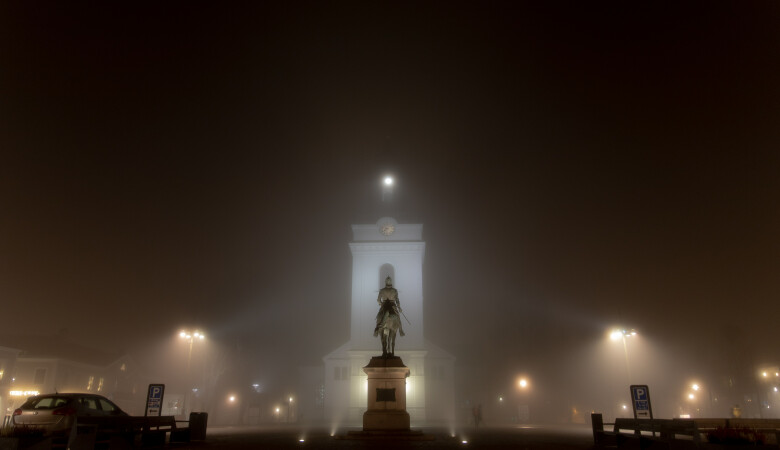Living Beyond Selfish Pleasures: Pleasing God by Pleasing Others (Romans Sermon 108 of 120)
July 16, 2006 | Andy Davis
Romans 15:1-3
Brotherly Love
Introduction: The Weak and the Strong
This morning we're looking at Romans 15:1-3, and we're looking here at the issue of how the strong should minister to the weak. Two of the greatest ideological enemies, of Christianity in the 20th century, were communism and Darwinism and both parted company with Christianity on the issue of how the strong should relate to the weak. First communism in 1875, German philosopher Karl Marx summed up the communist ideology with this phrase, "from each according to his ability to each according to his need". What people don't realize is how rooted in Christianity that idea is. One professor at Southeastern called communism a Christian cult or heresy, and it is with God removed. The ethos of Christianity of taking from the strong and giving to the weak. The only problem is, it was coercive enforced by the government, not given freely. From each according to his ability, to each according to his need.
Provision and Sharing in the Old Testament
You see at first in the time of the Exodus, when the manna came, bread from heaven laying all over the ground. How easy would that be? Those of you struggling with your jobs, you don't have to do it, you just go out and collect dinner from the ground. Of course, it's the same for 40 years, but it was still an open provision of God, and God commanded that they go out and collect as much as they needed just for the day. And it says in Exodus 16, "This is what the Lord has commanded, 'each one is to gather as much as he needs. Take an omer for each person that you have in your tent.' And the Israelites did as they were told, some gathered much and some gathered little. And when they measured it by the omer, he who gathered much did not have too much, and he who gathered little did not have too little."
The idea is this, the young strapping Israelite men, would go out and collect far more than they needed and they could bring it back to grandma or grandpa, the weak in the tent. And there would be plenty in the tent for everybody, they didn't need to worry about tomorrow for God will provide again tomorrow. And so, he who gathered much didn't hoard it. They didn't keep it for themselves, but they used it freely and openly for the weak in their own tents and the weak in the community, and so the strong ministered to the weak, they gathered as much as everyone needed, and the next day there was more provision. And so he who gathered much did not have too much, and he who gathered little did not have too little.
Provision and Sharing in the New Testament Church
Paul used the same principle in urging the Corinthians financially. As he said, "God has been abundant to you and given you more than you need. The saints in Jerusalem, or the church at Jerusalem, they don't have enough. And so there should be equality. He who gathers much, shouldn't have too much, and he gathers little should not have too little." But the basic idea is that the strong are using their strength, the resources that God has given them in service of those that don't have, in service of those that are weak. And so, we get a glimpse into the life of the early church, their life together. So beautiful in Acts 2:44 and 45. "All the believers were together and had everything in common, selling their possessions and goods they gave to anyone as he had need."
Now, some people say that sounds like communism. The difference is they wanted to, they delighted to do it. They did it because they wanted to build up the strong or the weak and make them strong, that they wanted to take their needs, whatever they had and make them available to those that had needs.
It was voluntary. So also in Acts 4:32, "All the believers were one in heart and mind." See that's different than communism. There it's forced on you or you going to jail if you resist. But there, they said, We wanted to do it. They were one in heart and mind, and no one claimed that any of his possessions was his own, but they shared everything they had. And Paul set the example on how the strong should be ministering to the weak. In his farewell address to the Ephesian elders, he said, "You yourselves know that these hands of mine have supplied my own needs and the needs of my companions. In everything I did, I showed you that by this kind of hard work we must help the weak, remembering the words the Lord Jesus himself has said: 'It is more blessed to give than to receive.'"
So what is the context of this teaching in Romans 15:1-3, on the strong and the weak. Well it's in the Book of Romans and in 11 chapters Paul lays out that magnificent doctrine, the Gospel of our salvation, whereby sinners like us can be made just in the sight of God, and then can be sanctified by the ministry of the Spirit for the rest of our lives until at last we are glorified, and fully saved in his presence. Sin no longer has any touch on us, we will be in redeemed bodies, we will be living in a new heaven a new earth, the full glorious salvation. "Oh, the depth of the riches, the wisdom, and the knowledge of God. How unsearchable his judgments Paul says, and his path beyond tracing out." Romans 1-11, the glorious doctrine of our salvation. Then Romans 12-16 is the application. How then shall we live? And we've been seeing again and again the issue is how Christians should be treating other people. There's a horizontal aspect here.
How we should be dealing with those outside the church, how we should be dealing with those inside the church, and all of it to the glory of God. Now, as we've been looking at Romans 14, and now into chapter 15, it's amazing, we will find that Paul gives almost a chapter and a half to the issue of how strong faith-filled understanding Christians should deal with those who haven't arrived yet, on the issue of disputable matters, and his yearning is to keep the church united. A spirit-filled, holy fruitful church, not fracturing, not dividing or fragmenting, nor rumbling into different factions and groups that have different views on debatable issues. But rather that they should stay together. And why? Because this is the ordained instrument of Almighty God for the destruction of Satan's empire and Satan would love nothing better than infiltrate the local church and get it squabbling and bickering on debatable issues, so that they cannot do the glorious ministry God has in mind for them to do.
And so we have this church at Rome. The church at Rome was a mixed church. There were Jews and Gentiles, both believing in Christ, both loving Christ. But they were having a hard time it seems, reading between the lines, having a hard time staying together. The issue with the laws of Moses, the Jewish lifestyle, the Jewish culture and the ceremonial laws. How much was that going to be part of the church's life? And Paul desires the strong Christians to help the weak, and not allow any, not one of Christ's precious ones to slip through the cracks. There they were in Rome, in the imperial city surrounded by all the trappings of worldly power and success, surrounded by the imperial majesty of Rome, surrounded by paganism, and wickedness.
And there were the Jews with the lure always to go back to the synagogue, the old covenant lifestyle. And so there were forces pulling on that church to just crumble and fall back into what they had been before. It would have been so easy for this fragile coalition of Jew and gentile church to fragment and for pieces of the crumbling structure to fall away and be lost forever. And so he's writing about the issue of the strong and the weak. In Romans 15:1, he says, "We who are strong ought to bear with the failings of the weak and not to please ourselves."
I. Darwinism vs. Christianity: The Strong and the Weak
Now, that second great attack on Christianity was Darwinism. You've heard of the slogan connected with Darwinism, the survival of the fittest. It's not something that you find in the origin of the species is something rather that British economist Charles Spencer, after reading Darwin's work came to. He came to understand this concept of the survival of the fittest. And Darwin embraced it.
He thought the law of natural selection, a little hard to grab on to, and so that was a good slogan, a fit slogan for his views. The survival of the fittest. Now this economist Spencer apply the idea to all areas of life, but especially to his area, economics. And what he was saying is, in the principal of economics companies which offer better goods and services survive better in the marketplace and tend to accumulate an ever-growing market share, poorly adapting companies will be forced out by better adapting ones. They will be killed by the competition. Have you seen some of those ads in which there are people sitting around as dinosaurs? They're literally dinosaurs. And the idea is, if you don't stay with the program technologically, you will become obsolete.
It's the idea of the survival of the fittest, it's a dog-eat-dog world out there. The powerful and the strong rip to shred the weak and the infirm, and leave them for dead. It's a brutal world out there, the brutal world of nature. Alfred, Lord Tennyson when he was writing some poems was grieving over the early death of a friend, a young man, and he was grieving over it. And he was talking about and used a very famous expression, talking about nature red in tooth and claw. There's a sense of viciousness out there in the world, the strong devour of the weak.
Evolutionary thinking that links humanity to brutal domination of the weak at every level. A little boy torments a spider, he in turn is tormented by his bigger brother. They in turn perhaps abused by their parents, maybe the wife abused by the husband. At societal levels, one society is stronger economically, more powerful militarily, they're going to invade and start building an empire and so it is in the world, the strong devour the weak. They crush them and destroy them.
The Vision of Daniel and World History
And so, Daniel in Daniel 7 sees a vision of all of world history, and he looks out and he sees the great sea and the Four Winds tormenting the surface of the sea, churning it up. And up out of the sea, come four great beasts and these are empires and the fourth of those beasts we interpret to be Rome. And up it came out of the ocean, a great beast. Daniel 7:7. After that, in my vision at night, I looked and there before me was a fourth beast terrifying and frightening and very powerful. It had large iron teeth, it crushed and devoured its victims and trampled under foot whatever was left. That was Rome. And that's what these people lived with, that's what they understood, the power that was Rome.
It was a beast, and at the center of it all was the city of Rome. Rome was the eternal picture of might makes right, of the beast of government crushing and devouring whatever is weak. And so the world for 500 to 1000 years, East and West lay trembling in chains at the feet of this beast. That's what the world does with its strength, that's what the world does with its power. It uses it to dominate the weak. That is natural my friends, but God is calling the church to be supernatural. God is calling the church to look at strength and weakness very differently. And so we have to look at Romans 15:1-3 as a call from God Almighty to the church to think differently about power and about strength. Christian obligation then is the strong need to bear the weak. Now from the very beginning, God intended that we, the human race dominating because of our intelligence, not because of our physical strength, there are animals stronger than us.
The Powerful are Called to Protect the Weak, not Dominate
But because we are created in the image of God, he intended us to take a position over the physical creation similar to his own. We create in the image of God, and so God called on Adam to serve and protect the Garden of Eden. Genesis 2:15 in the Hebrew, that's what he's there to do. He's to help the garden be everything it can be. To put his strength and his power at the disposition of physical creation, and enhance and nurture it, not destroy it. And this is exactly how God is with us, isn't it? The Almighty God omnipotent creator and what does he do with his power except serve us? I love it in Isaiah 40, probably one of my favorite chapters in the Old Testament. What an incredible chapter, in Isaiah 40:10-12, it says, "See, the sovereign Lord comes with power, and his arm rules for him. Behold, his reward is with him and his recompense accompanies him."
That's the almighty power of God, omnipotence on the move, that's God. But the very next verse says this, "he tends his flock like a shepherd. He gathers the lambs in his arms and carries them close to his heart. He gently leads those that have young." The tenderness of God, it's harnessed power applied to the benefit of his people. And then the very next verse, we go back to omnipotence, "who has marked off, measured the waters in the hollow of his hand, and with the breadth of his hand marked off the heavens? Who has held the dust of the earth in a basket or weigh the mountains and the scales or the hills in the balance."
This is amazing, here's almighty, omnipotent God and he's carrying you gently like a lamb in his arms, that's the way God is. So Paul is teaching in line with the consistent pattern of the Bible, strength and power are meant to serve and to protect the weak not to dominate. And so we have a developed... In the Bible, a developed theology of strength and weakness. The word weakness here, that's in this verse, has a powerful heritage in the New Testament. Frequently translated sickness or frailty, it relates to humanity and sin, all the effects of sin on us. All human beings are weak and sick because of sin. Jesus said, "It's not the healthy who need a doctor, but the sick, I'm not come to call the righteous but sinners to repentance."
And it says so beautifully in Romans 5:6. "You see, at just the right time, when we were still powerless, Christ died for the ungodly." Do you think of yourself today as mighty and strong and powerful? Well you're not. You're not. And neither am I. We were at one time powerless, and when we were powerless, Christ died for the ungodly. That's what it says, same word. This is precisely why Christ came into the world to carry our weaknesses. The same Greek word is used in Matthew 8:16, 17, speaking of Jesus' miraculous ministry. When evening came, it says many who were demon-possessed were brought to him and he drove out the spirits with a word and healed all the sick. That word sick is the same one we're dealing with here.
This was to fulfill what was spoken through the prophet, Isaiah, he took up our infirmities and carried our diseases. Do you see that the same idea of carrying of picking it up and carrying it? "We who are strong ought to bear the frailties of the weak and not to please ourselves." That's the picture of Christ, the very thing he did. Jesus' healing ministry was therefore a visible picture of his spiritual work of salvation from the weakness and disease of sin, itself. The blind cannot see, the deaf cannot hear, the mute cannot speak, the lame cannot walk, the dead cannot do anything. The picture of our inability and weakness, that's what Jesus chose for the canvas on which he's painting his omnipotence, he could have done all kinds of miracles, but instead it's in the context of our weakness, his power is made perfect. And so he heals.
Now, even after we've come to faith in Christ, we're still weak aren't we? Anyone want to come up and testify otherwise? You want to come up and say I'm mighty and strong and have no need of Christ any longer, I can make it from here. How long do you think you'd last? But the demons come. I don't need anything from God, I'm fine, whatever the devil wants to do to me, I can make it from here. You really want to say that we are still frail and weak even still, we still have the flesh, don't we? There's that fleshly yearning after wickedness, it's still in us. And Christ is our merciful and faithful high priest and he went through a bodily life so he could help us in our weakness. He could intercede for us and point the way to holiness. Someday however, oh, isn't someday a wonderful day for a Christian? Someday we'll be free from all weakness. That which is sown in weakness will be raised in power and we'll be done forever with sin. We'll be done forever with temptation. What a glorious thing that is.
In the meantime, it seems good for us to know how weak we are. Don't you think? Doesn't it seem good for us to be reminded consistently how weak we are? And so the apostle Paul, even makes a whole theology of weakness in 2 Corinthians, in 12:10, he says, "When I'm weak then I'm strong." You know why? Because when I'm weak then I realize I can't do it on my own. I must have Christ, I'm totally dependent on him, he's the vine I'm the branch, I must have him. "When I'm weak then I'm strong." What is Paul saying in Romans 15:1-3? But let's make it collective. When we are weak, then we're strong. When we bring our weaknesses together, and somebody else' strength compensates for somebody else' weakness. The body is bound together. But if the strong despise the weak and say, "You can't carry my shoes, I can't believe you don't have the New Covenant figured out by now. Why don't you come back when you get it figured out. In the meantime, we're moving on."
Oh, it will fragment. It will fragment. And how arrogant is it to not realize it's not going to be long before you're the weak one and you need some strong one to come help you. And so Paul is in effect saying, this idea of weakness and strength is to bind the church together. Now who are the strong and weak in this passage, what are we talking about? Well, I think the strong are mature Christians who have fully understood the balance that I was preaching about in Romans 14, who understand Gospel freedom from legalism. They don't need to follow all those rules and regulations, any longer. Not talking about immoral issues, not talking about wickedness, or sin. But we are talking about debatable issues, they've got it, they understand. They know, they have understood the message of Galatians. They understand Gospel freedom.
They also understand Gospel purity, they're not lurching off into sin, they're walking holy and godly and upright lives. But Paul is urging them to add a third thing, understand Gospel unity understand it's not enough just for you to be the strong one for you to have a good grasp on those things.
What about your brother, what about your sister? Help them, stay with them, don't give up on them, keep them together. That's what he's doing. Now notice Paul includes himself isn't that wonderful? "We who are strong ought to bear with the failings of the week." He's including himself. And that's a reasonable. He was arguing from that perspective in Romans 14, he knows that he can eat anything. He understands the ceremonial law, he wrote the Book of Galatians, he understands freedom, he's including himself in the strong, but he's saying, "We ought to bear with the weak."
Not called to merely “put up with” the Weak, but Rather to Carry The Failings of the Weak
Now literally, this word "bear with your," it doesn't mean put up with, that's not what we're talking about, "we who are strong not to put up with the failings of the weak."
The NIV's translation is a little unhelpful here. There's one little word here that I think ought to be removed. And in other translations it is, in the New American Standard it's not there. Because I think it's a better translation in this case. In Romans 15:1 says, "Now we who are strong ought to bear the weaknesses of those without strength and not just please ourselves." Not bear with, bear them. Pick them up and carry them. That's what it means, carry them. Not bear with. Not put up with.
March of 1942, the Japanese Imperial Army was in the process of conquering the Philippines, they captured some 70,000 American and Filipino troops in Bataan and forced them to march through horrendous conditions over 65 miles to a railway depot where they'd have probably one of the most horrific railway rides in history. Was an awful time and it came to be known as the Bataan Death March. The heat was scorching. Many of the soldiers marching had tropical fevers or dysentery. The Japanese guards refused them any water, no water at all. And diseased and weakened man began to stagger, fall behind or collapse in the searing heat. And this only infuriated the Japanese guards more who had no respect for them at all. Japanese soldiers hardly ever surrendered and so they had no respect for a soldier that would surrender. And so for them, as far as they were concerned, they were dead men already. And so if they would stagger or fall out, they would just be bayoneted, immediately. Well, it wasn't long before the soldiers recognized that if a buddy is staggering and weak, you got to hold them up, you got to carry him basically. And so they'd have arm and arm and they would basically drag some people who barely could stand up. Because they knew if they would let him go, they're dead.
Are the stakes any less for the church? Are they any less? Do we have any less vicious enemies of the temptations, any less for us, should our concern for each other be any less? We're supposed to strengthen the feeble knees. And the arms that are about to give way it says in the Book of Hebrews. We're supposed to care about each other. Jesus didn't come to save 90% of the elect, my friends. He said that all that the Father gives him will come to him. And of all that come to him, he will lose none, "but raise them all up at the last day." And he includes us in that work. We're supposed to notice how people are doing, it's supposed to matter if somebody's staggering and falling. What's going on in their lives? We're supposed to watch over one another in brotherly love.
Who Are the Strong and Weak Here?
Now, it's interesting how we play the different roles for each other at different times. Who are the strong and the weak here? Well, probably, the majority of the strong were Gentiles who understood the New Covenant, they understood what Christ had done, they understood the law of Moses, they understood because there really wasn't a big issue for them. "Oh, so I don't need to do all that stuff that I've never really been doing?" Okay, well good, good news, that's wonderful.
But what about the Jews? "You mean I don't do that anymore? I've been doing it all my life." What a struggle for them. But what's so interesting is the whole idea of bearing the weak was reversed back in Romans 11. Remember there the analogy of the olive tree and there's a root structure there. And the root structure is Jewish, my friends. Abraham, Isaac and Jacob. And he's talking there to the Gentiles sating, "Look, don't be arrogant about the branches that have been stripped of. If you do, consider this, you [Gentiles] do not support [or 'bear' same Greek word] the root, but the root supports you." And so I began to meditate on this whole thing and now I thought sometimes we play one role and sometimes we play another. And it is arrogant to think you're only ever strong helping these weak people around who just don't seem to get it.
If you have that attitude, it's not going to be long before you will need some ministry from a strong person. God will humble you. We are to be together, we are to help each other make it through this world. That's exactly what's going on here.
II. A Life of Pleasing God by Pleasing Others
And so how do we do that? Well, we do it by living a life of pleasing others. Specifically, pleasing God by pleasing others. Look at these three verses, "We who are strong ought to bear the failings of the weak and not to please ourselves." See the word "please" there? "Each of us should please his neighbor for his good to build them up for even Christ did not please himself, but as it is written, 'the insults of those who insult you have fallen on me.'" So the theme here of these verses is, "Who are you living to please? Who are you seeking to please?" That's what it's about.
Now, that brings us into the area of pleasure, the area of pleasure, we're talking now about pleasure. We have a great struggle with pleasure, don't we? We're struggling with it, it's a fight for us. America is a pleasure crazed nation. Industrial Revolution, technological advances created multiple labor-saving devices. One thing Karl Marx said that I found interesting, "A society that makes useful things makes useless people." I found that interesting. And so as technology advances after a while you find yourself with lots of time on your hands. Labor-saving devices produces lots of time. What are you going to do with that? Well, technology has the answer to that too. I find it amazing when younger people can't find a way to get through a beautiful afternoon without doing something electronic. Don't you find that amazing? I remember when I was a kid, there was nothing electronic. Alright? There were things electric, but we weren't allowed to use them. You know, TV and all that. Go outside, it's a beautiful day.
But it's a problem for us, not just for the kids, for everybody. As a result, recreation then becomes a purpose in the center of everything. Living for the weekend. Result of this is an attitude of extreme selfishness. Every person relentlessly seeking their own pleasure. And some of this pleasure craze sadly has seeped into the church decades ago.
AW Tozer wrote this, "The abuse of harmless things," by that he means lawful things that you're allowed to do. That's a Romans 14 issue. "The abuse of harmless things is the essence of sin. The growth of the amusement phase of human life to such fantastic proportions is a portent, a threat to the souls of modern men. It has been built into a multi-million dollar racket with greater power over human minds and human character than any other educational influence on Earth. For centuries the Church stood solidly against every form of worldly entertainment recognizing it for what it was, a device for wasting time, a refuge from the disturbing voice of conscience, a scheme to divert attention from moral accountability. For this, she got herself abused roundly by the sons of this world. But, of late, she has become tired of the abuse and has given over the struggle. She appears to have decided that if she cannot conquer the great God entertainment she may as well join forces with him and make what use she can of his power. So today we have the astonishing spectacle of millions of dollars being poured into the unholy job of providing earthly entertainment for the so called sons of heaven." AW Tozer, decades ago.
What would he say now? There's a whole movement, the Church Growth Movement, of which Willow Creek and their model is leading the way. And if you go to that kind of a church you can find a cappuccino bar, you might find a food court in a church. Can you imagine a food court in a church? But it's there. I was reading about one church and actually went to their website and watched some of their worship service. Granger Community Church in Indiana. Begins with about a five or seven minute rock concert and then after that laser light shows, they give away iPods. This guy, the pastor, walks around with one of those things at a ball game that fires out T-shirts into the crowd. I'm not doing that, it's not going to happen.
I don't know what I would hit anyway. Tertullian during the time of Roman persecution said, "The blood of martyrs is seed for the church." Church Growth Movement said, "No, entertainment is seed for the church. That's how it grows." Well, I'm not sure what you're going to grow with that. Are you going to grow people that are really denying themselves, taking up their cross and following Jesus? That's genuine discipleship, genuine conversion. I worry about it both in terms of evangelism and discipleship afterwards. What are we showing to the church?
God is not Against Pleasure
Now, let's talk about it for a minute. The issue here is first and foremost not about pleasure itself. There's nothing wrong with pleasure itself. May I say to you that God is the ultimate pleasure being in the universe? You may be surprised about that, but did you know that God does everything after his own pleasure? It says in Psalm 1:15, verse 3, "Our God is in heaven, he does whatever pleases him." That means he's pleased about everything he's doing. So pleasure's not wrong. Our God is a God of delight, of joy, of rejoicing, of celebrating. Like when the prodigal son comes back, how many parties did they have in heaven? Lots of people being converted right now. And God is leading the way, there's more joy in the presence of the angels of heaven over one sinner. God's doing the rejoicing. He is the heavenly Father saying, "Quick do this... We got to celebrate." God is a God of pleasure, we should not think he's not. Our own salvation brings him great pleasure. Meditate on that. Luke 12:32, "Fear not little flock, for it is your Father's good pleasure to give you the kingdom." he delights in it, he enjoys saving people.
And salvation itself for you and me culminates, Psalm 16 verse 11, "You have made known to me the path of life, you will fill me with joy in your presence, eternal pleasures at the right hand of God." Oh, God is not a God against pleasure, not at all. As a matter of fact it's because he wants you to have real pleasure at his right hand that he wants you to be stripped of all these worldly lusts which do not provide ultimate pleasure. They're a dead end, they kill pleasure in the end. And that's the nature of idolatry, taking a good gift from God and worshipping it so it becomes the center of your life.
Romans 12:25, they "worshiped and serve created things more than the Creator who's forever praised, Amen." And so there are repeated warnings in Scripture against giving yourself over to earthly pleasures. It's idolatry. In James 5 it says, "Come now you rich, weep and howl for the miseries that are coming upon you, you have lived on earth in luxury and in pleasure, you have fattened your hearts in a day of slaughter." 2 Timothy 3:4 warns about being lovers of pleasure rather than lovers of God. Hebrews 11 talks about Moses who chose to be mistreated along with the people of God rather than to enjoy the pleasures of sin for a short time. And so the solution here is to recognize that God himself is the ultimate pleasure. And all of the good gifts of God can come or go as he pleases. But God is our reward, he is our pearl of great price. He's our reward at the end of the Christian life, God himself. So God's not against pleasure, that's not it. The issue is not pleasure itself.
Pleasing Others Is a Higher Priority than Pleasing Ourselves
Secondly, the issue here is not pleasing others versus pleasing God. Now that's wrong, it's called being a people pleaser. You know what I'm talking about? Being a people pleaser there is having other people as your audience and you're going horizontal and you're trying to live to please them forgetting what God thinks. That's the danger of legalism by the way. When you start getting into a legalistic lifestyle, it's like, "Hey, somebody noticed what I've done. I was wholly over here. Did you see it? I gave a bunch of money to the poor." There's an announcing with trumpets. It's the whole problem with legalism, it's very horizontal. Your audience is other people. So Paul talked very plainly against this in Galatians 1 verse 10 where he says, "Am I now trying to win the approval of men or of God? Or am I trying to please men? If I were still trying to please men, I would not be a servant of Christ." Now, that's not contradictory of what he's teaching here in Romans 15.
That's not the issue either. It's not that we're going to please others at the expense or rather than pleasing God, that's not it. Well, what is it then? Well, the issue is pleasing ourselves rather than pleasing others, that's the issue. The issue is, will you live a life that feeds your own desires to the expense of what it's doing to your brother or sister? That's the question. Selfishness is the enemy of Christian unity that Paul is seeking to destroy here. Christian freedoms can be selfish things, selfish pleasures. And so Paul's calling on Christians to be willing to please others for their sake. Look at verse 2, "Each of us should please his neighbor for his good to build them up." This is a call to deny personal pleasures and freedoms and privileges for the sake of Christian unity. It is the call of the cross. "If anyone would come after me, he must deny himself and take up his cross daily and follow me. For whoever wants to save his life in this world will lose it."
It's the Christian life, it's the call of the missionary life. First Corinthians 9:19. Paul says, "Though I am free and belong to no man I make myself a slave to everyone to win as many as possible." You've heard perhaps the story of those Moravian young men in the 18th century who wanted to reach some slaves on a West Indian sugar plantation and willingly voluntarily gave up all their freedoms, sold themselves into slavery and worked alongside these slaves out in the field to win them to Christ. Put that picture in your mind, giving up on pleasing yourself so that you can please others.
III. Christ the Ultimate Example
Now obviously, Christ is the ultimate example. Christ did not please himself. Look at Verse 3, "For even Christ did not please himself." Christ is the powerful one. We, the weak ones, he, the strong one. Used his strength to help the weak. Christ, the perfect example. Now don't misunderstand, don't think Christ was displeased to save us. God the Father, pleased; Christ disgruntled. Don't get that picture. Actually it says in Psalm 40, "Here I am, I delight to do your will oh God."
He says, "My food is to do the will of him who sent me and finish his work." He delighted in it, he delighted in saving us. It says in Hebrews 12:2, "Let us fix our eyes on Jesus, the author and perfecter of our faith, who for the joy set before him endured the cross, scorning its shame and sat down at the right hand of God." He delighted to save us. That's not it and that's not what we're saying here. Don't think of Christ as reluctant or opposed to the will of God, the Father in the salvation world. He delights in it, but above all things he's setting his pleasure aside so that he can please God and please us. That's the point.
And he says in John 6, "I've come down from heaven not to do my own will, but to do the will of him who has sent me. And this is the will of God that I shall lose none of all that he has given me, but raise them up at the last day." He was there to do the Father's will. And the culmination of that we see so beautifully in Gethsemane, don't we? When Jesus falls on his face with blood coming off of his face praying with intensity that we cannot even calculate saying, "Father, if it is possible, let this cup be taken from me, yet not what I will, but what you will." Again don't think of Christ as unwilling, but he's setting his own pleasure and his own will aside to serve the father.
And notice how it says, "even Christ did not please himself." One of my favorite Christmas songs is, "I wonder as I wander." Ever heard that one? It's a beautiful song, very sweet, sweet song. Came right from, I think, the state, North Carolina. It's a folk song. Beautiful and one of the verses said this,
"If Jesus had wanted for any wee thing,
star in the sky or bird on the wing.
Or of all God's angels in heaven for to sing,
he surely could've had it, 'cause he was the king."
So if Jesus had come down from heaven and reclined on silk pillows like a Turkish Sultan and demanded that we human beings wait on him hand and foot, he would've deserved it. He deserved it, he's the son of God. But even Christ did not please himself. It's the very same thing that Jesus said, he put the word "even" in there. "Even the Son of Man did not come to be served but to serve and to give his life as a ransom for many." Christ did not please himself. Rather he came to serve we who are weak and needy. He could have used his power to serve himself. Like in the desert after fasting 40 days and 40 nights. If you're the son of God, turn these stones into bread. He wouldn't do it. He didn't use his miraculous power to save himself. He didn't get down off the cross when they called them to prove himself. He did not use his miraculous power to please himself, he didn't use his teaching ministry ability to please himself, he was the greatest teacher in history. No one ever spoke the way that that man did.
He was spellbinding in his preaching. And what does he do with it? Well, he purposefully teaches things that will offend the vast majority of his hearers so they just go away and stop wasting his time and theirs. In John 6, "I tell you the truth, unless you eat my flesh and drink my blood, you have no life in you." Oh boy, can you imagine someone believing... Person taking him aside and saying, "Jesus, you know you've been doing really well up until today. That was bad teaching right there. What are you doing?" Even the disciples, the apostles, they did not understand what he was saying. Jesus didn't please himself for this teaching ministry nor did he please himself when he died on the cross and nor did he please himself even in his resurrection. He came back and gave many convincing proofs to his disciples that he was alive for their benefit, for their sake's.
Christ's focus here is accepting abuse meant for God and for God's people. Look at verse 3, "For even Christ did not please himself, but as it is written, the insults of those who insult you have fallen on me." Psalm 69, as it is written, it's clearly a Messianic Psalm with many prophecies about Christ. John 2 quotes this when Jesus was cleansing the temple. And it said, "for zeal for your house has consumed me and the insults of those who insult you have fallen on me." Do you know what the effect of his cleansing of the temple was? Well, at one level, the effect was to get the Jewish mafia, the high priest and his family and all that that were making huge money on the temple concessions. So enraged with Jesus, they wanted to kill him.
Did Jesus not know that would happen? No, he knew very well that if he cleansed the temple, the insults of those who insulted God would fall on him and kill him. And not only that, but he sends it out to us. The insults we deserved even from God himself for our sin fall on him, he is our substitute. He dies in our place and takes our abuse. But it doesn't even end there, even for the redeemed, whenever a non-Christian persecutes a Christian, it's him they're persecuting. And so he says, on the road to Damascus, "Saul, Saul, why do you persecute me?" "Who are you, Lord?" "I am Jesus whom you are persecuting." The insults of those who insult you have fallen on me. The unity between the Son and the Father, the unity between the Son and the church, that's the idea. It's getting out of yourself and caring about the glory of God and what's happening to your brothers and sisters in the Body of Christ, that's why he quotes this. Now, what application can we take to this message?
IV. Application
First, can I urge you to assess yourself on the issue of the strong and the weak? First of all, do you see yourself as weak? Do you see yourself that way? I mean relative to Christ, needy of his ministry every moment. Secondly, when you are strong relative to other believers, are you using your strength to minister to them? Are you using your spiritual gift to build them up? When you see someone discouraged you pat them quick on the back, "Well, pray for you." And off you go. Or do you sit down and invest in their lives? Do you care enough to know what's happening to your brothers and sister spiritually? "We who are strong ought to bear the failings of the weak and not please ourselves."
We come now to a time of the Lord's Supper. To me this is a time for us to remember how weak we were apart from Christ. To look backward at what Jesus did on the cross and how he gave his life. This celebration is for Christians. For those who have made a profession of faith in Christ testified to it by water baptism. If you have not come to faith in Christ yet, don't take from the Lord's Supper, but while the Lord Supper's going on, cry out to Christ. He is very merciful, he will save you from your sins. Look to the cross, look to the blood of Christ, look to him and be saved, trust in him. The rest of you who are believers, as you're preparing your hearts, think about how you're living toward the body of Christ. Are you out of fellowship with anyone? Is there a relationship that needs fixing?
Are you using your spiritual gifts to build the body of Christ? One of the ideas of the Lord Supper is we all take from the same loaf there's one body together, we are all partakers of Christ. Look horizontally and then look to the future, the time when your weakness will be swallowed up in victory, when Christ will come again and all of his saving work will be finished. Close with me in prayer.






























